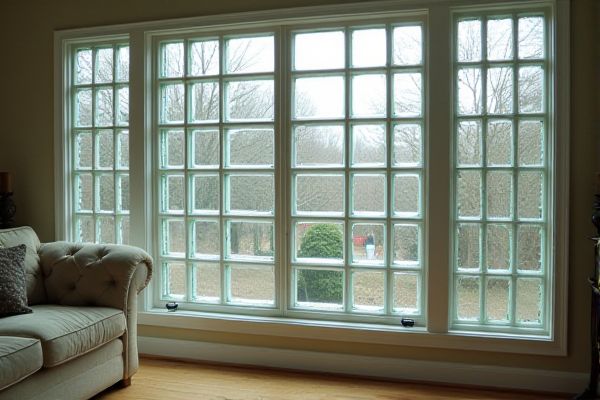
Glass block windows offer enhanced security and insulation with their thick, textured design, while frosted glass windows provide privacy by obscuring visibility with a smooth, translucent surface. Discover which window option best suits Your home's style and functionality needs by reading the rest of the article.
Table of Comparison
| Feature | Glass Block Window | Frosted Glass Window |
|---|---|---|
| Privacy | High - Blocks direct visibility completely | Medium - Obscures view but allows light |
| Light Transmission | Moderate - Diffuses light evenly | High - Allows ample natural light |
| Durability | Very Durable - Thick, impact-resistant glass blocks | Moderate - Standard glass with surface frosting |
| Installation | Complex - Requires mortar and precise fitting | Simple - Can be installed like regular window panes |
| Design Options | Limited - Block shapes and patterns | Varied - Multiple frost patterns and styles |
| Maintenance | Low - Easy to clean and stable | Moderate - Frost surface may need gentle cleaning |
| Energy Efficiency | Good - Insulating properties | Depends on glass type - typically less insulating |
| Cost | Higher - Due to materials and installation | Lower - More affordable materials and labor |
Introduction to Glass Block Windows and Frosted Glass Windows
Glass block windows consist of thick, translucent glass units that provide strong privacy and superior insulation, making them ideal for exterior and security-focused installations. Frosted glass windows feature a sandblasted or acid-etched surface that diffuses light while maintaining a sleek, modern aesthetic suited for interior and bathroom spaces. Both options enhance natural light but differ significantly in texture, privacy level, and thermal performance.
Material Composition and Structural Differences
Glass block windows consist of thick, hollow glass units sealed together with mortar or silicone, providing enhanced insulation and structural integrity. Frosted glass windows are made from single or double panes of tempered or laminated glass treated with acid etching or sandblasting to achieve a translucent surface. The solid, modular construction of glass blocks offers superior impact resistance and privacy compared to the thinner, more fragile composition of frosted glass panes.
Privacy Features: Comparing Effectiveness
Glass block windows offer superior privacy due to their thick, textured design that distorts visibility while allowing natural light to enter, making them highly effective for bathrooms and exterior walls. Frosted glass windows provide moderate privacy by diffusing light and obscuring shapes but may still allow vague silhouettes to be seen through the glass. When maximum privacy is a priority, glass block windows generally outperform frosted glass windows in blocking visibility without sacrificing light transmission.
Light Transmission and Illumination
Glass block windows provide a higher level of light transmission due to their thick, translucent structure that diffuses natural light while maintaining privacy. Frosted glass windows offer moderate illumination by scattering light with their etched or sandblasted surface, creating a softer and more uniform glow indoors. Both options enhance ambient lighting but glass block windows typically allow more daylight to penetrate without compromising privacy.
Energy Efficiency and Insulation
Glass block windows offer superior energy efficiency and insulation due to their thick, multi-layered design that significantly reduces heat transfer and minimizes air leakage. Frosted glass windows provide moderate insulation but generally allow more heat loss or gain because they are typically single-pane or less robust than glass blocks. Your choice depends on whether maximizing thermal performance or achieving diffused light and privacy is your primary goal.
Design Variety and Aesthetic Appeal
Glass block windows offer a distinctive, textured appearance with a range of patterns and thicknesses that create a retro or industrial aesthetic, enhancing privacy while allowing light diffusion. Frosted glass windows provide a sleek, modern look with customizable opacity levels and subtle designs that lend elegance to both residential and commercial spaces. Both options cater to diverse design preferences, but glass blocks emphasize a more architectural, three-dimensional effect, whereas frosted glass focuses on smooth, minimalistic aesthetics.
Installation Process and Complexity
Glass block windows require a more intricate installation process involving precise alignment, mortar application, and support framework, often demanding professional expertise to ensure structural integrity. Frosted glass windows typically involve a simpler replacement or retrofit procedure, where pre-cut panes or films are installed directly into existing window frames with minimal modifications. Your choice between the two will influence the installation complexity, time, and labor costs significantly.
Maintenance and Durability
Glass block windows offer superior durability due to their thick, impact-resistant construction and sealed installation, making them highly resistant to weather and vandalism. Maintenance is minimal, as the blocks do not require painting or regular cleaning beyond occasional washing, and their solid structure reduces the risk of leaks and drafts. Frosted glass windows, while aesthetically versatile, tend to be more fragile and prone to scratches or chips, requiring more frequent cleaning to maintain appearance and occasional resealing to prevent moisture infiltration.
Cost Comparison and Value for Money
Glass block windows typically have higher initial installation costs due to materials and labor but offer excellent durability and energy efficiency, providing long-term savings. Frosted glass windows are generally more affordable upfront and easier to replace, yet may require more maintenance and offer less insulation. Your choice depends on balancing immediate budget constraints with the desire for lasting value and enhanced thermal performance.
Ideal Applications and Best Use Cases
Glass block windows excel in providing enhanced security and insulation, making them ideal for basements, bathrooms, and exterior walls where privacy and durability are critical. Frosted glass windows offer superior light diffusion and aesthetic appeal, perfect for interior spaces like office partitions, shower enclosures, and bedrooms requiring privacy without sacrificing natural light. Your choice depends on whether you prioritize structural strength and thermal efficiency or decorative privacy and soft light filtering in your specific application.
 homyna.com
homyna.com